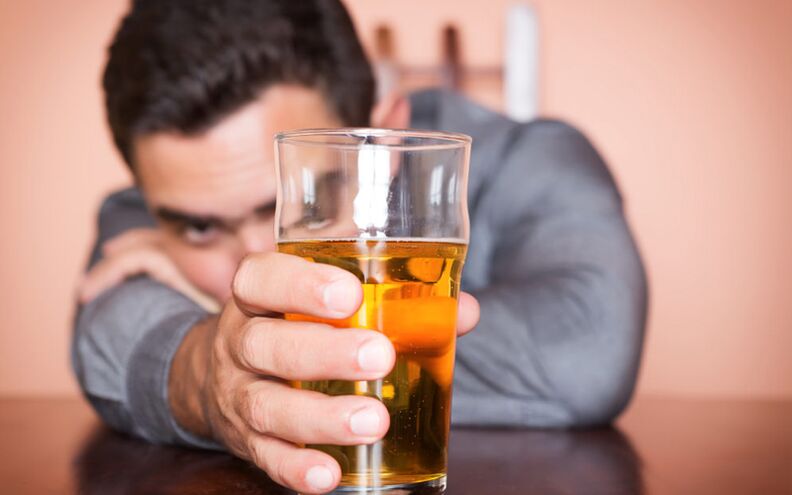
Addiction to alcoholic beverages has long been considered a serious illness.alcoholism– a multifactorial chronic pathology that is often accompanied by psychological and physiological disorders. The mechanism of turning a bad habit into a dangerous disease is constantly being studied and attempts are being made to establish its connection with the genetic characteristics of a person, his lifestyle and character.
According to WHO statistics, around 140 million men and women worldwide suffer from alcoholism. The disease has no age limits. Nowadays even teenagers and old people drink alcohol. Alcohol addiction leads to a loss of behavioral control, an increase in the amount of drinking, aggressiveness during sudden withdrawal, and prolonged drinking bouts.alcoholicgradually loses family, friends and career. His connection to society is severed, his circle of interests is limited to drinking, and personal humiliation begins.
Not only the drunkard suffers from alcoholism, but also his relatives. The family has to endure the inappropriate behavior of the husband and father, get used to excessive alcohol spending from the family budget, and endure domestic violence. Often a woman becomes addicted to strong drinks. In such cases, treatment will be difficult and lengthy, since the fairer sex is more emotionally dependent on alcohol. In any case, a person addicted to alcohol needs urgent drug treatment.
Signs of alcoholism
Alcohol addiction is a progressive disease that leads to serious illnesses. Notice the firstSigns of alcoholism, you should not ignore them or expect the alcoholic to stop drinking on his own. It's not going to happen. The disease requires medical intervention - only an experienced narcologist can accompany a person on the path to recovery.
The following signs indicate the development of alcoholism:
- every happy or sad event is a reason to drink;
- the need for alcoholic beverages is increasing every day;
- the dose required to become intoxicated increases;
- Memory lapses occur after drinking libations;
- the protective gag reflex, which previously protected the body from intoxication, disappears;
- A withdrawal syndrome occurs - a healthy person does not feel the desire for a hangover after a feast.
Due to physiological immaturity, adolescents become addicted to alcohol much more quickly than adults. Addiction often develops in people who grew up in a family of alcoholics and consider this lifestyle normal. The desire for alcohol arises under conditions of chronic stress, against the background of family or work problems, loneliness and, in some cases, due to too stable and emotionally unsaturated free time.
Alcohol addicts usually do not admit that they are sick. It seems to him that drinking is a panacea for all problems and does no harm. This is self-deception. It is important that your loved ones knowhow to help an alcoholic, stopping the disease before critical consequences occur.
The harm of alcohol

Constant consumption of alcoholic beverages has a negative effect on all internal organs and systems of a person, and also shortens life expectancy. The central nervous system and brain are particularly affected. Ethanol and its breakdown products cause neurons to die. Cells are not restored, the most important neuronal connections are disrupted. Doctors say alcoholics develop microscopic ulcers and scars on the surface of the brain. Prolonged drinking leads to deterioration of cognitive functions, loss of short-term memory, and auditory and visual hallucinations.
Internal organs suffer from toxic substances. Alcoholics are more likely to be hospitalized with heart attacks and strokes and to die from liver cirrhosis and hepatitis. Men and women have impaired sexual function and are unable to produce healthy offspring. Alcohol causes a severe blow to the gastrointestinal tract. Varicose veins of the esophagus appear, the intestinal walls are deformed and stomach ulcers and colitis are provoked. IfTreatment of alcoholismIf this is not started in time, the patient is doomed to die.
How to help an alcoholic recognize the problem?
If a person suffers from alcoholism, he needs outside help. It is important for close relatives to understand that there is no need to play the savior at this stage. You cannot put moral pressure on an alcoholic, scold him or constantly control him. Making you feel guilty for your behavior while drunk will not have a positive impact on the situation. There is no need for a drunk to try to solve his problems. Such relationships are called codependent. This is not the norm.
How to help an alcoholic understand the problem? People from the patient's close environment need to develop behavioral tactics that allow them to build special relationships. In the process of communication, the alcohol addict himself must understand:
- How harmful is drinking alcohol for him?
- how a drunken lifestyle negatively affects his family and work;
- how health deteriorated due to constant poisoning;
- What happens if you don't stop poisoning the body with ethanol?
Intervention is the only true and effective way to unobtrusively and without pressure get the patient to look at themselves from the outside. It is often used by narcologists to motivate the patient to go to the clinic to receive appropriate treatment.
How to help an alcoholic stop binge drinking?
Binge drinking is a dangerous condition. Long-term consumption of alcoholic beverages is associated with serious intoxication. Ethanol poisons the body, its breakdown products do not have time to be excreted by the liver and the excretory system, and toxins accumulate. If you suddenly stop drinking, the alcoholic will experience severe withdrawal symptoms, which in particularly critical cases lead to vital organ failure.
Relatives of a drunk person should remember that a hangover is difficult to endure. During this time the patient is looking for a new dose. Without receiving it, he falls into a depressive or aggressive state. Physical violence often occurs against weaker family members - wives, elderly mothers, children. Any attempt to shame him, to lead him down the path to sobriety, will be met with hostility and will cause outrage.
I do not know,How to help an alcoholic stop drinking? Don't risk his health. Contact experienced narcologists who will slowly and without stress alleviate the patient's condition, both physical and psycho-emotional. Only a specialist can, through professional intervention, teach the patient to look at his life from a different perspective. The doctor will work with the alcoholic alone or together with a psychologist. An integrated approach always leads to good results. Even if consent to further treatment is not obtained immediately, the process of accepting the addiction problem has already begun in the subconscious. The patient often then voluntarily relinquishes control over alcohol consumption to the helping party.
How can you help a drunk alcoholic?

The duration of the attack is 4-10 days. In particularly severe cases, an alcoholic may drink for a month or more until his body no longer responds to ethanol. During this period, the patient does not work, does not observe personal hygiene rules and does not eat normally. The consequences of such a long period of drunkenness are critical as they affect well-being, health and appearance.
How to help a drunk alcoholicand is that even possible? You will not be able to cope with the withdrawal symptoms on your own. Drinking a lot, sedatives and moral support can alleviate the condition, but this is not enough to stop binge drinking.
In a hospital hospital or at home, a narcologist conducts detoxification, prescribes medications to stabilize the condition, quickly remove toxins and relieve the load on the internal organs. The patient is under the supervision of medical personnel and receives emergency care if necessary. Narcologists and psychologists know itHowhelping an alcoholic stop drinkingand successfully master this difficult task.
How to help an alcoholic at home?
A short period of intoxication (less than 3 days of alcohol consumption) can be overcome on your own.How to help an alcoholic at home:
- make sure you drink enough – at least 2. 5 liters per day;
- Include ascorbic acid or fruits high in vitamin C in your diet;
- arrange to take sorbents, for example activated carbon or silicon-based preparations;
- Give the patient simple sedatives - valerian, sedative drops;
- Eat a gentle diet rich in vegetables, grains and protein.
But even if your health improves and the alcohol addict vows to stop drinking, you should not miss the opportunity for effective treatment in an inpatient drug clinic.
How to help an alcoholic?
In some cases it is the only effective methodCoding of alcoholism. Turning to narcologists and psychologists will be a real salvation from a sad outcome. Doctors will be able to find words so that the patient independently realizes the seriousness of the situation and voluntarily decides on treatment. After detoxification, the specialist selects the most appropriate coding method and radically changes the life of an alcoholic for the better.
The patient refuses to go to the clinic? Call a narcologist to your home. A visiting doctor carries out all procedures in an environment that is comfortable for the alcohol addict and guarantees 100% anonymity.

































